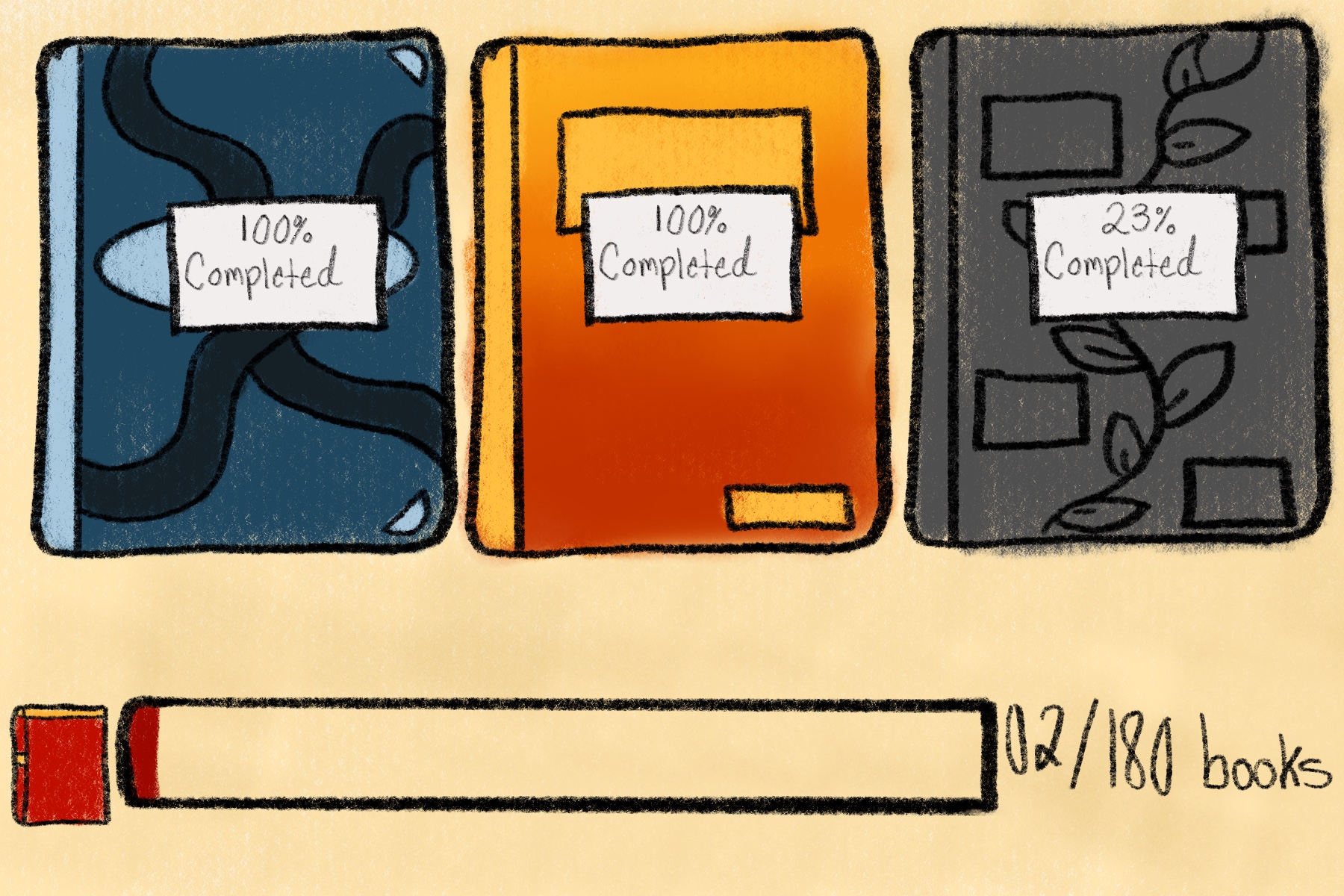Every year, millions of people participate in the Goodreads challenge. The popular reading app has become well-known for creating a robust online community dedicated to all things books. On the platform you can find recommendations, read reviews, and create personally curated “shelves,” or digital book lists. Users have the option every January to set a reading goal for themselves. Then Goodreads, in all its computer-generated glory, will help users track their progress toward that reading goal throughout the year. The app often provides a percentage letting users know if they are “on schedule” to complete their challenge, as well as showing users the progress other people on the platform are making.
While the Reading Challenge is one of the highlights of participating on Goodreads, it is not without its own drawbacks. Recently, I completed mine for the 2023 year and was left with mixed feelings. What started as a fun way to motivate myself quickly devolved into a game that needed to be won, except there were no winners. Just me, who was suffering in December when I was still 15 books behind my projected goal of 99.
The Goodreads Reading Challenge is not a bad thing, but the culture surrounding it has become less focused on promoting literacy and more so on perpetuating the status of a “well-read” reader. As a result, when people start thinking about their reading journey in terms of numbers instead of feelings, the whole point of reading books is being lost. As a survivor of the Goodreads reading challenge, I can safely say that setting a high bar for yourself needs to be done only if it’s something you feel like you can reasonably achieve without sacrificing your sanity.
No one wants to feel left out on a social media platform. Goodreads exists to make people feel part of a community, one that treasures reading as an art form and exalts it. This is the best part about participating on the app, and yet much of that love goes out the window once the reading challenge is introduced. There are technically no “winners” on Goodreads, and yet I couldn’t help feeling like I was losing every time I looked at how far behind I was on my goal of 99 books.
The app provides you with updates on how everyone else in your network is doing with their reading goal. Many users had higher goals than me, with some projecting (and being on track) to read as many as 200 or 300 books a year. None of these users I was friends with online tried to belittle me for having a lesser reading goal, but constantly seeing their reading quantified had a debilitating effect on me. Ingrained in the app is this comparison between your reading journey and that of others, something I have grown to recognize as limiting. While Goodreads’ purpose is not to establish a culture of comparison, that is what it becomes when people are struggling to read five books a month and they see someone on their twentieth read of March.
Moreover, people often feel like they need to set a high reading goal on Goodreads to perpetuate the idea that they are well-read and efficient at reading. It can sometimes feel like there is an implicit peer pressure to have a high goal, simply to not appear as the standout who wants to read 10 books in a year while everyone else is reading 100.
Participating in the Goodreads Reading Challenge means understanding that the perfect reading goal is subjective. No one is going to think less of you for not having the highest reading goal. The app was created to destigmatize reading, so if people create goals for themselves based on what they think the norm is, they’re not reading for themselves—they’re reading for others. People also read at different paces. It can be just as challenging and rewarding to read 10 books in a year as it is to read 100. Instead of beating yourself up for not having as high a goal as the next person, focus on your own victories and progress.
As is often the case, people with high reading goals are not “smarter” or more “talented” than you. They just have more free time. Let’s face it: life gets busy. Between a job, school, social life, and any other daily responsibilities you face, it can be hard to find time for reading at the end of every day. People who set high goals for themselves are admirable for being able to prioritize books every single day, but that’s just not the reality for most people. Reading is eternally relative, and there’s no point in thinking of yourself as lesser for a low reading goal.
It’s important to consider what’s within reach for you when setting your annual Reading Challenge. Factor in your responsibilities and what you know will challenge you without stretching yourself too thin. How your challenge will look in comparison to others shouldn’t even be considered. I promise that no one on Goodreads will laugh at you for setting a lower bar.
Consider also that quantifying your Goodreads challenge can put you on the fast-track to falling out of love with books, which is of course a sin that any bookworm strives to avoid committing. And yet, it happened to me around December when reading suddenly became a chore instead of a passion. In setting your reading challenge too high, the danger becomes reading not for pleasure but statistics.
No one wants their emotional journey through a book to be reduced down to a number. But when you set unreasonably high goals for yourself, you take away the chance to revel in that post-reading clarity you always get right after finishing a good book. Instead, what happens is that you’re so pressed for time and desperate to complete your challenge that you don’t let yourself fully appreciate what you just read.
So next time you’re worried about falling outside the cultural norm, remember that you’re already doing admirable work by taking the time to track your own reading journey. Whether you read one book or 50 in 2024, you’re signifying that you carved out space to read and lose yourself in another world for a while. And that is worth celebrating.

















